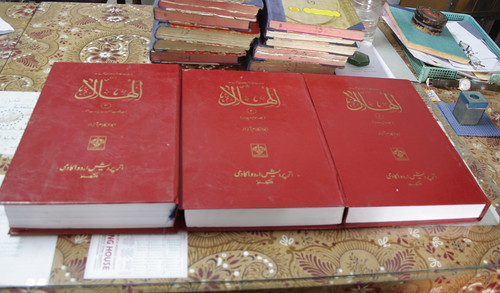By TCN Special Correspondent,
Lucknow (UP): Muslim intellectuals linger on discussions ruing government’s apathy towards Urdu language in the state of Utter Pradesh. However, a literary treasure in Urdu has found no takers amongst the self proclaimed custodians of the language.
The case in point is Al Hilal weekly journal, established in 1912 by great freedom fighter and first education minister of independent India, Maulana Abul Kalam Azad. Seminars and functions will be held on Maulana Azad’s 53rd death anniversary on Tuesday; however none of the group comes forward for Azad’s work.

In order to preserve Maulana’s heritage and works beside promotion of Urdu language, the state Urdu academy, published a compilation of Al Hilal. The step was taken, so that the Urdu loving populace and Muslim intelligentsia of the state may benefit and be aware of Maulana Azad and Urdu’s contribution in the freedom struggle.
The compilation includes all issues of Al Hilal and is in three thick volumes. The total cost in the publication of over 1000 copies was around Rs 27 lakhs. The volumes were put on sale at a tag of Rs 4200 but not a single copy was sold. A discount of 25 percent thus reducing the price to Rs 3050 also failed to attract any Urdu lover.
The favorite past time of every Muslim leader worth his name is bashing the government ruing poor state of Urdu language. The state government presently is spending nearly 100 crores towards establishment of a Urdu Arbi Farsi University in the state, however there are hardly any takers for Maulana Azad’s legacy written in Urdu language.
“It is a pity that there are no takers of Maulana Azad’s work. Claims of Urdu language being in bad shape do not stand if we ourselves are not concerned about the language, Azad’s work are even more relevant in present scenario,” remarked AQ Hashmi, who runs a Maulana Azad Academy in the city.
During the British Raj the weekly journal in Urdu Al Hilal was widely circulated and was a means to inculcate revolutionary thoughts among Muslims. The all time great leaders as Mahatma Gandhi and Jawaharlal Nehru too wrote their pieces in the journal. The journal was also instrumental in strengthening the Hindu-Muslim bond after the two communities drifted post Morley-Minto reform.
When the British government had banned Al Hilal in1914 under Press Act, Maulana Azad started another weekly called Al-Balagh with the same mission but it also met the same fate.

